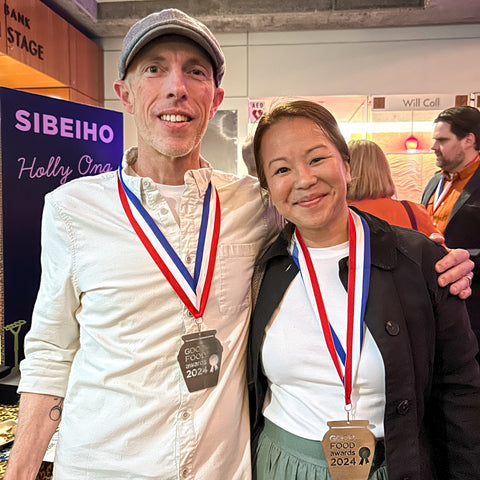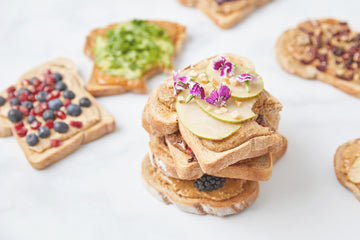
Pictured: Mark (the author) with fellow 2024 Good Food Award Winner Christina Teav of Mama Teav’s.
2024 Good Food Awards
This past week, I was in Portland, OR, with a few hundred of our fellow American food crafters to accept our second consecutive Good Food Award in the Pantry category. Each year the Good Food Award judges conduct a blind tasting before awarding a select few Winners across a dozen categories of food. Most awards and certifications in the food world recognize either social and environmental responsibility or great craft and flavor. The Good Food Awards, however, were founded on the belief that truly good food is not only delicious and nutritious, but also good for people and the planet. Receiving this year’s award for Lum Lum Thai Curry Peanut & Cashew Butter was a tremendous honor for our entire team (Pistachio Crunch won a Good Food Award last year). It was particularly exciting because “Lum Lum” represents the first commercially made nut butter of its kind and furthers our mission to change the way people think about nut butter.
Inspiration & Community
Every time we connect with the greater Good Food community, it feels like a homecoming. These are our people: makers, crafters, cooks, preservers, growers, beekeepers, brewers, roasters, and masters of all forms of culinary alchemy who share a dedication to achieving the best possible quality through the most sustainable means. In the span of just an hour of being in the company of this group, I had inspiring conversations with a hot sauce maker from Texas, a bean-to-bar chocolate maker from Arkansas, a jam maker from Vermont, a granola baker from California, and a bitters brewer from Oregon. The Good Food community is also a beautiful reminder of our country’s delicious diversity of food traditions, family recipes, and creativity. Many different paths and stories had led us to the same place, but we were all kindred spirits happy to be among the similarly inspired.
Unconventional Gatherings
Big Spoon Roasters doesn’t exhibit at many tradeshows. They are very expensive for a small business like ours with no outside funding, and most tradeshows are not designed with the needs and limitations of small-batch food makers in mind. However, we make a point of setting up our table at the foundation’s Mercantile “un-tradeshow” events, which launched in 2015, whenever we can. The events are not free, but they are relatively affordable and infinitely more egalitarian; every maker gets an equally sized table. These Mercantile events, which usually take place in NYC, SF, and now Portland, inspire us through the connections with other makers, and they fill us up with positive energy that we can bring back to our amazing team of artisans in NC.
We are grateful to the Good Food Foundation, the Awards, and the greater Good Food community for all it does to support small-batch makers like Big Spoon Roasters and the values we represent. The Mercantile events are highlights of our year, and we look forward to the next ones in New York City (June 22) and San Francisco (September 15). We also hope that the foundation considers adding more public shopping hours to the Mercantile concept (as they did last month in Portland). See you at the next Mercantile, I hope!
Some history of the Good Food Awards and our connection to them:
Slow Becomes Good
In 2008, when Sarah Weiner and Dominic Phillips worked together to produce Slow Food Nation, which brought together 85,000 people to celebrate good, clean and fair food at North America’s largest ever sustainable food event in San Francisco, I was working for Counter Culture Coffee and serving on the board of our local chapter of Slow Food USA. I had known and admired Sarah through her work with Slow Food USA, and the idea of such a festival in the U.S. was incredibly exciting to me. Several close friends and colleagues had been delegates to Terra Madre Salone del Gusto, Slow Food’s flagship international festival held annually in Turin, Italy. Not even a year earlier, we had hosted Slow Food founder Carlo Petrini in NC with a picnic showcasing some of our region’s amazing farmers, chefs, and artisans.
A Pantry Left Behind & Rediscovered
Whereas the farm-to-table trend in restaurants had been gaining steam for decades at this point, the American “craft food movement,” which focused more on bringing handmade quality and small-batch authenticity to our

Sarah and her team of Slow Food USA co-organizers were hip to this, and they did an incredible job of shining a light on American food craft from coast to coast. The same team started Seedlings Projects in 2010, a not for profit ‘do tank’ for the food movement, which launched two flagship programs its first year:
- Farm to Desk in Washington, D.C., which was the first integrated garden, classroom and cafeteria program in a public school in our capital city, with food topics woven into core subject curriculum. The concepts and lessons were shared widely to other schools all around the city where they continue to flourish.
- The Good Food Awards, which was anchored with an annual event in San Francisco and quickly grew to include over 2,000 entries from all fifty states.
Megan and I founded Big Spoon Roasters that same year, and with a lot of the same values in mind. We realized that one of our favorite foods – peanut butter – had been stuck in a state of bland inertia during this American craft food renaissance. At a time when there was mounting indisputable evidence that much of the “food” being manufactured had been making us and our environment sick, we saw (and still see) food as a powerful, joyful connective force with the potential to do good. As the throngs of people at Slow Food USA can attest, we were not alone.
A New Craft Food Movement
It was becoming clear that more and more people agreed with Jean Anthèlme Brillat-Savarin’s famous words, “the destiny of nations depends on the manner in which they are fed.” By that I mean that more people seemed to be paying attention to not just what they were eating, but how their fruits and vegetables were grown, how the animals lived that became their meat, and what, exactly, are all those words under “ingredients” listed on the jars in their cupboards. Michael Pollan’s books about getting back to eating real, whole foods were bestsellers, farmers’ markets were thriving, and retailers like Bi-Rite Market, Erewhon, Whole Foods Market, and Central Market were making room on their shelves for more small-batch, artisan products that set higher and higher standards for sustainable quality.
As people’s awareness grew, so did a demand for more quality and transparency, which in turn inspired the work of small-scale food entrepreneurs across the country. The Good Food Awards continued to grow, and the Good Food Foundation expanded into new programs to further support the often overlooked small-batch crafters of the American food system: the Good Food Guild (2012), Good Food Merchants Alliance (2015), Good Food Mercantile (2015) and Good Food Fund (2018).
Big Spoon Roasters has been a proud member of the Good Food Guild since its inception, and we hope that membership and awareness about its member businesses continues to grow.
If you read this far, thank you, and perhaps you’d be willing to help with a question: What can we do as a business and member of the Good Food community to better connect our work and values with you as you shop (online and in stores)? Let us know at info@bigspoonroasters.com.
-Mark

